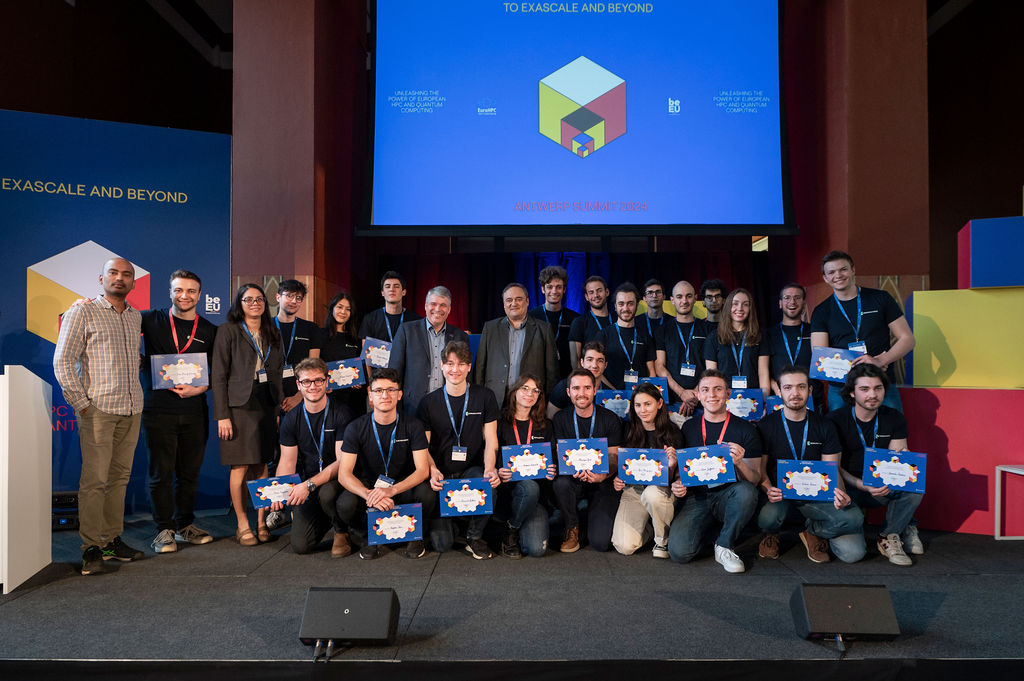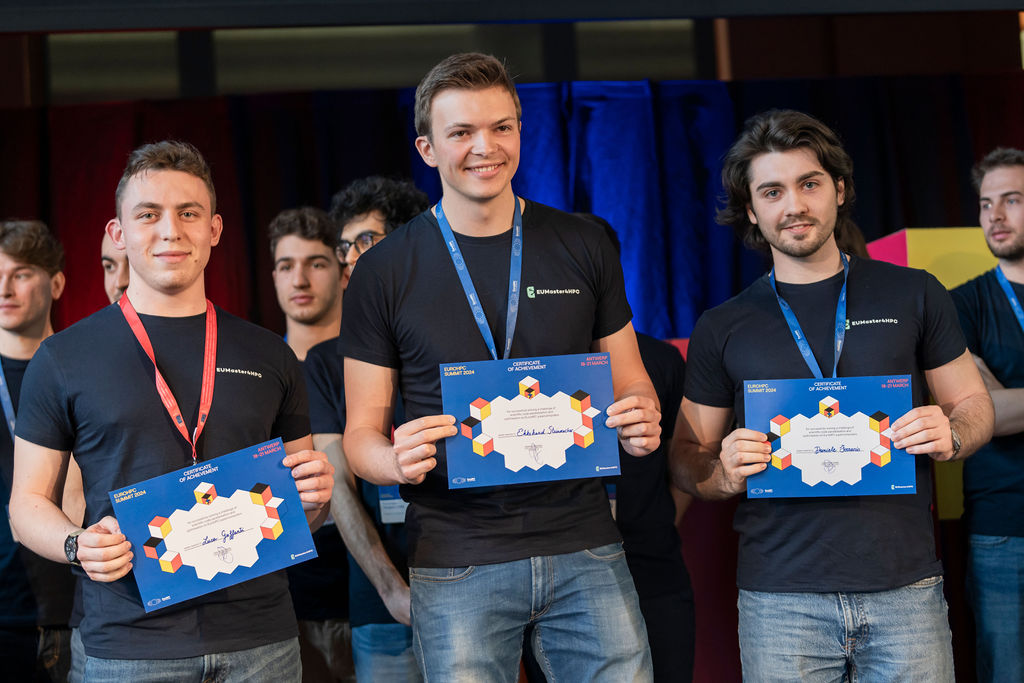Results of the EUMaster4HPC Student Challenge at EuroHPC Summit 2024

The student challenge aims to provide EUMaster4HPC students with an opportunity to present themselves at the EuroHPC Summit 2024 and to showcase the master programme during the event.
This year, students were asked to collaborate in small teams of three to parallelise and optimise a basic numerical problem, such as an iterative solver (Conjugate Gradient), across various architectures employing different parallel programming models. They were granted access to Luxembourg’s National Supercomputer, MeluXina, courtesy of LuxProvide, which boasts diverse types of nodes.
The students were tasked with porting, parallelising, and optimising the code for various node types. They were given the freedom to choose the types of nodes they wished to utilise based on their abilities. Moreover, they were encouraged to delve into different parallel programming models, such as SYCL, CUDA, MPI, OpenMP, OpenACC, and OpenMP Offloading.
Following the porting of the code, a performance and scalability analysis was conducted, along with an assessment of the achievable performance.
The participating students submitted comprehensive reports encompassing in-depth performance and scaling analyses, the generated code, and draft posters for presentation at the Summit. Each group was supported by a mentor throughout the process. The students’ deliverables underwent evaluation by a jury, which awarded a first place, two ex aequo second places, and a special mention for Green Computing. Furthermore, the participant teams have been provided individualised feedback by the jury to enhance each student’s learning journey.
- Scalability: Better strong scaling for the smallest problem size is better: 0.20
- Number of different node types: Larger is better: 0.05
- Complexity of the used node types: 0.0 in case of CPU-only nodes, 0.5 for GPU nodes, 1.0 for FPGA nodes: 0.10
- Achieved performance portability: zero in case only a single node type is used: 0.10
- Achieved performance portability: zero in case only a single node type is used: 0.10
- Code quality: 0.05
- Variety of explored programming models: More is better: 0.10
- Quality of the performance analysis: 0.20
- Quality of the documentation of optimisations: 0.10
Student challenge results

1st place: EUMaster4HPC Challenge Parallelizing the Conjugate Gradient Method
- Daniele Ferrario, Politecnico di Milano
- Luca Guffanti, Politecnico di Milano
- Ekkehard Steinmacher, Università della Svizzera italiana
2nd place ex aequo: Report on the Challenges and Insights of Parallelizing the Conjugate Gradients Method
- Luca Venerando Greco, Politecnico di Milano
- Tommaso Trabacchin, Politecnico di Milano
- Francesco Gnan, Università della Svizzera italiana
2nd place ex aequo: Parallelization of the Conjugate Gradient Solver for Dense Linear Systems on the Meluxina Supercomputer
- Melanie Tonarelli, Politecnico di Milano
- Edoardo Carrà, Politecnico di Milano
- Henrique Gil, Università della Svizzera italiana
Green Computing Mention goes to
- Kacper Kramarz-Fernandez, University of Luxembourg
- Eyup Ensar Coban, Friedrich-Alexander-Universität Erlangen-Nürnberg
- Alberto Guerrini, Politecnico di Milano
Jury member are
- Dirk Pleiter, KTH Royal Institute of Technology (Sweden)
- Pascal Bouvry, University of Luxembourg (Luxembourg)
- Cristina Silvano, Politecnico di Milano (Italy)
- Marisa Gil, Universitat Politècnica de Catalunya (Spain)
- Harald Koestler, Friedrich-Alexander-Universität Erlangen-Nürnberg (Germany)
- Milen Petrov, Sofia University (Bulgaria)
- Didier Smets, Sorbonne University (France)
- Maria Ribeiro-Sancho, Barcelona Supercomputer Centre (Spain)
- Fabrizio Magugliani, E4 Computer Engineering (Italy)
- Tomas Karasek, IT4Innovations National Supercomputing Center (Czech Republic)
Mentors list
- Gladys Utrera Iglesias, Universitat Politècnica de Catalunya (Spain)
- Işıl Öz, Izmir Institute of Technology (Turkey)
- Jakub Homola, IT4Innovations National Supercomputing Center (Czech Republic)
- Dylan Kierans, KTH Royal Institute of Technology (Sweden)
- Hristo Iliev, Sofia University (Bulgaria)
- Pierre-Henri Tournier, Sorbonne University (France)
- Georgios Kafanas, University of Luxembourg (Luxembourg)
- Ezhilmathi Krishnasamy, University of Luxembourg (Luxembourg)